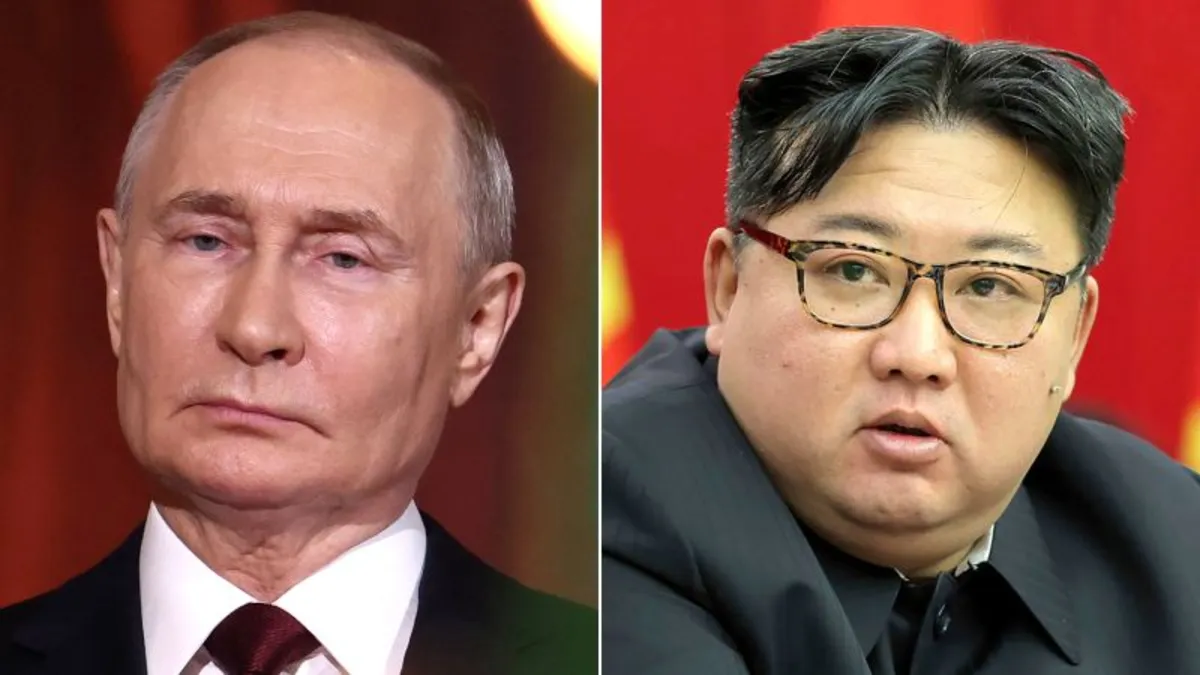
North Korean leader Kim Jong Un and Russian President Vladimir Putin are set to be among over two dozen foreign leaders attending China’s significant military parade next week, as announced by the Chinese Foreign Ministry on Thursday. This grand event will take place in Beijing’s Tiananmen Square on September 3, commemorating the 80th anniversary of the conclusion of World War II following Japan's formal surrender. The inclusion of Putin and Kim at the top of President Xi Jinping's guest list suggests a remarkable display of unity among these autocratic leaders.
The parade will provide an extraordinary photo opportunity, with Kim, Putin, and Xi standing side by side on the Gate of Heavenly Peace in Beijing. This moment will symbolize the collaboration and solidarity among these leaders. The North Korean state news agency, KCNA, has confirmed Kim's attendance, marking his first visit to China since 2019. Since assuming power in 2011, Kim has only undertaken 10 foreign trips, with his latest journey occurring in 2023, where he met Putin at a remote spaceport in Russia's far east.
This military parade represents a rare occasion for Kim, the leader of the world’s most heavily sanctioned regime, to appear alongside other global leaders who are gravitating toward the alternative world order that Xi and Putin have been advocating. The confirmation of Kim’s participation comes just days after US President Donald Trump expressed interest in meeting the North Korean leader this year.
China is using this parade to project its military strength amid a backdrop of heightened geopolitical uncertainty, particularly as Trump redefines American alliances and partnerships. This event also coincides with China’s assertive stance towards Taiwan and ongoing territorial disputes with neighboring countries.
A total of 26 foreign heads of state and government are expected to attend the parade, including Pakistan’s Prime Minister Shehbaz Sharif, as stated by Assistant Foreign Minister Hong Lei during a press conference in Beijing. Notably, Indian Prime Minister Narendra Modi, who will be present in the Chinese city of Tianjin for a summit of the Shanghai Cooperation Organization this weekend, is not listed among the attending leaders. Other attendees include Myanmar's junta chief Min Aung Hlaing, who currently serves as the acting president following a military coup in 2021.
Interestingly, leaders from major Western capitals are noticeably absent from the guest list, despite China's significant role as a partner of the Allied powers during World War II. The nation’s struggle against Japan’s invasion became a crucial front in the war in Asia, concluding in 1945 with Japan’s surrender. Following the war, China experienced ongoing conflict between communist and nationalist forces until the former triumphed in 1949, leading to the establishment of the People’s Republic of China, which Xi currently leads.
The military parade will last approximately 70 minutes and feature over 10,000 troops, more than 100 aircraft, and hundreds of pieces of ground equipment, showcasing China's expanding military power under Xi’s leadership. The modernization of the People’s Liberation Army (PLA) has been a central focus of Xi's administration. This tightly choreographed event will provide a rare glimpse into China’s rapidly advancing military technology, with all equipment on display reported to be domestically produced and currently in service. Many of these assets will be making their debut, including cutting-edge drones, electronic jamming systems, hypersonic weapons, and missile-defense technologies.
For decades, Beijing has been North Korea’s primary political and economic benefactor, offering critical support to its heavily sanctioned economy. North Korea remains China’s only formal ally, underpinned by a mutual defense treaty established in 1961. In recent years, North Korea has strengthened its ties with Russia, particularly amid Moscow’s ongoing war against Ukraine. This evolving relationship complicates the geopolitical landscape in East Asia and poses challenges for China’s efforts to maintain regional stability.
As Xi observes the alliance between Putin and Kim, he remains cautious about the implications of their partnership, especially following their landmark defense pact signed in Pyongyang last year. This agreement includes mutual commitments to provide military assistance, a development that has raised alarms in the US and among its Asian allies.
During the press conference, Assistant Foreign Minister Hong emphasized the “traditional friendship” between China and North Korea, recalling their historical collaboration against Japan’s invasion eight decades ago. He stated, “China is willing to continue to work hand in hand with North Korea to strengthen exchanges and cooperation, advance socialist construction, and closely collaborate in promoting regional peace and stability as well as safeguarding international fairness and justice.”
This report has been updated to include additional developments regarding the upcoming military parade and the geopolitical implications surrounding it.